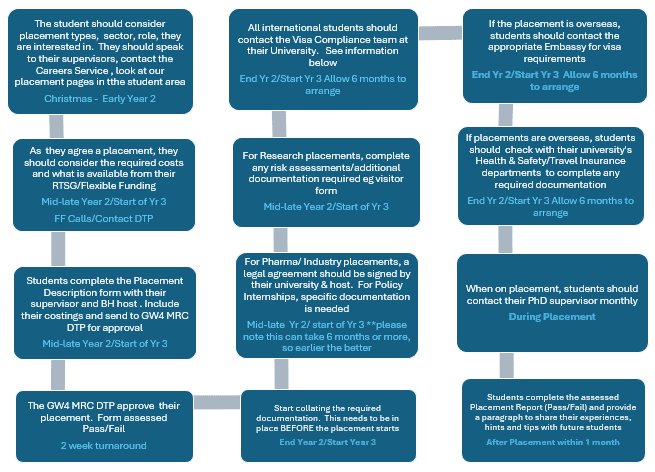- Required documentation
- Required Documents
- Leave of Absence/Interruption to Studies
- Funding during your Broadening Horizons placement

Required documentation
Depending on the placement type, there is documentation to be completed at different stages of the process and it can take up to 6 months to get legal and contractual agreements in place, so please encourage your student to allow enough time when planning their placement.
NOTE: We are currently finalising MRC Broadening Horizons placement agreements with each of the GW4 universities and the information here will be updated as appropriate.
- Placement form: Fill out a Placement Description Form, outlining the main purpose of their placement and key responsibilities, including costing information, needs to be completed and sent to the GW4 DTP Hub (GW4BioMed@cardiff.ac.uk) for approval by the DTP Hub Director.
- Some sections will need to be completed by the student, the host supervisor and yourself.
- This form will be the first of the assessments for the placement and will be marked by Professor Emma Kidd on a Pass/Fail basis. Dr Giovanni Biglino is second marker if required.
- Legal agreements:
- Legal Agreements Industry/Government: A legal placement agreement is required between the host, the student and the student’s university. Some companies insist on their own documentation (eg large Pharma companies, ONS, Cambridge Cognition or policy internships).
- If no host documentation is in place, your student should use the GW4 template legal agreements for their HEI and they can contact the DTP Hub for support.
- Legal Agreements/Visitor Forms Research in an Academic Setting: A legal placement agreement is not necessarily needed for this but a visitor form from the host is required and/or a risk assessment.
- It should cover IP, confidentiality, insurance for the student while on placement, in addition to the risks involved in the actual placement.
- Legal Agreements Industry/Government: A legal placement agreement is required between the host, the student and the student’s university. Some companies insist on their own documentation (eg large Pharma companies, ONS, Cambridge Cognition or policy internships).
- Risk Assessments: Regardless of the placement type, including if it is UK or overseas, students must complete the appropriate Risk Assessment for their university to ensure they are covered by Health and Safety and are added to the university insurance. This may be your own university’s risk assessment form which usually needs to be signed by yourself or the Head of School/Department.
- Visa Compliance and Informing Universities of Off Site working: All international students must contact their visa compliance teams to ensure that their placement meets the terms of their visa, regardless of whether the placement is in the UK or overseas.
- As the placement is now integral and assessed, this should not be a major issue but the process is different in each institution.
- Additional contractual documents: Students should check with their placement host, regardless of sector, if there are any other contractual agreements to be put in place
- e.g. employer liability insurance, honorary contracts, Intellectual property, confidentiality etc not covered in the risk assessments or legal agreements
- Travel and Health Insurance: If the placement is abroad, there is advice for students and supervisors in the ‘Taking your Broadening Horizons Placements Abroad’. This also outlines Travel and Health insurance considerations.
Leave of Absence/Interruption to Studies
This placement is an integral and mandatory part of your studies, and therefore you are not required to take a Leave of Absence/Interruption to Studies, unless it is a paid placement.
If you are asked to take an Interruption to Studies by your university, please get in touch with the DTP team in the first instance. For Bristol, please contact fls-pgenquiries@bristol.ac.uk, FAO James, and he will support you with this.

Funding during your Broadening Horizons placement
As you will remain a student during your placement, your stipend will continue as normal. You will also be able to access your RTSG to cover travel and accommodation costs. Your host organisation may also help subsidise these costs. All direct costs for the placement e.g. consumables should be met by the placement host organisation.
You can also apply for Flexible Funding in October and March, and we will accept ad- hoc applications outside those times if your application is time sensitive. Please note there is a cap of £5,000 Flexible Funding during your PhD.
Please note that if your placement is paid, your stipend will be suspended for the three months as you cannot be paid twice for the same period.
